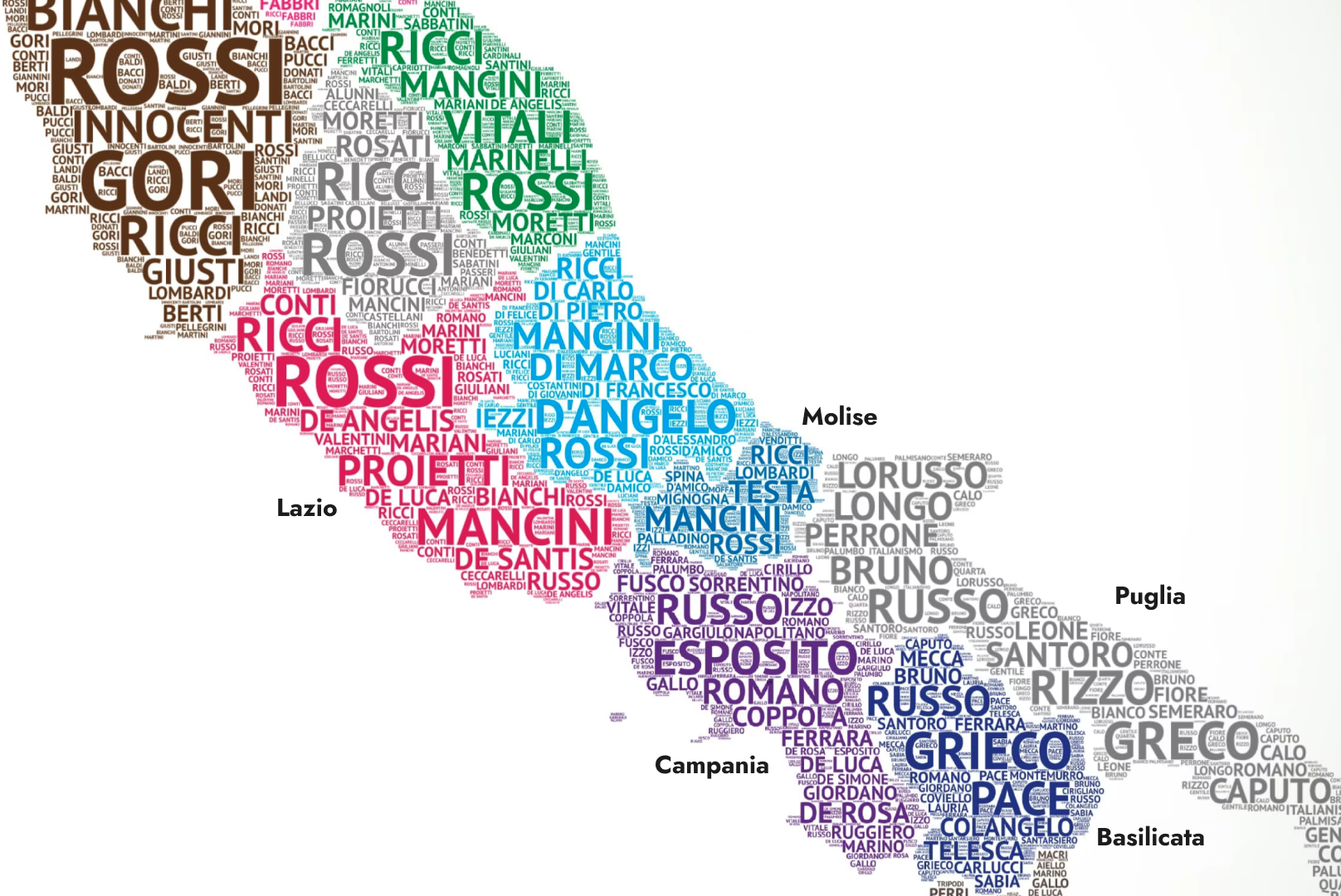The importance of Italian Surnames in genealogy research
Tracing your Italian ancestry is a fascinating journey that often begins with understanding the significance of Italian surnames. Italian surnames are rich in history and can provide crucial clues about your family’s origins. This guide will help you understand the importance of Italian surnames in genealogy research and how to use them to uncover your family’s Italian roots.
The origin of Italian surnames
Italian surnames, cognomi like we say in Italy, have different origins. Many surnames are derived from the following sources:
- Patronymic or Matronymic origins: These surnames are based on the first name of an ancestor.
For example, “Di Giovanni” means “son of Giovanni.” - Occupational origins: These surnames indicate the occupation of an ancestor.
For example, “Ferrari” means “blacksmith.” - Geographical origins: These surnames are derived from the location where an ancestor lived.
For example, “Napolitano” means “from Naples.” - Descriptive origins: These surnames describe a characteristic of an ancestor.
For example, “Bianchi” means “white-haired” or “fair-skinned.”
Understanding Regional Variations
Italy’s rich regional diversity is reflected in its surnames. Understanding regional variations can provide insights into your family’s origins.
- Northern Italy: Surnames in the north often have Germanic or Celtic influences. For example, “Rossi” and “Bruni” are common in this region.
- Central Italy: Surnames here often have Latin roots. For example, “Romano” and “Fabbri” are typical in central Italy.
- Southern Italy: Surnames in the south often reflect Greek, Arabic, and Norman influences. For example, “Esposito” and “Greco” are common in this region.
Using Surnames to Trace Your Ancestry
Once you understand the origins and regional variations of Italian surnames, you can use this information to trace your Italian ancestry.
Steps to Use Surnames in Genealogy Research:
- Identify the surname: Start with the surname of your ancestor.
- Determine the origin: Research the meaning and origin of the surname.
- Locate the region: Identify the region in Italy where the surname is most common.
- Search Local records: Access local civil and church records in that region to find more information about your ancestors.
Challenges in Surname Research
While surnames are a valuable tool in genealogy research, there are some challenges to consider:
- Variations in spelling: Italian surnames can have multiple spellings. For example, “Di Giovanni” can also be spelled “De Giovanni.”
- Common surnames: Some surnames are very common, making it difficult to pinpoint specific ancestors.
- Changes over Time: Surnames may have changed over time due to migration or clerical errors.
Professional Help for Complex Cases
If you encounter challenges in your surname research, consider seeking professional help. A professional genealogy researcher with expertise in Italian ancestry can provide valuable assistance, especially for complex cases involving common surnames or difficult-to-access records.
Conclusion
Italian surnames are a gateway to discovering your family’s history. By understanding the origins, meanings, and regional variations of Italian surnames, you can uncover valuable information about your ancestors and trace your Italian roots more effectively.
If you want the help of a professional researcher, contact us!
You will get a quote for building your family tree
The importance of Italian Surnames in genealogy research
Tracing your Italian ancestry is a fascinating journey that often begins with understanding the significance of Italian surnames. Italian surnames are rich in history and can provide crucial clues about your family’s origins. This guide will help you understand the importance of Italian surnames in genealogy research and how to use them to uncover your family’s Italian roots.
The origin of Italian surnames
Italian surnames, cognomi like we say in Italy, have different origins. Many surnames are derived from the following sources:
- Patronymic or Matronymic origins: These surnames are based on the first name of an ancestor.
For example, “Di Giovanni” means “son of Giovanni.” - Occupational origins: These surnames indicate the occupation of an ancestor.
For example, “Ferrari” means “blacksmith.” - Geographical origins: These surnames are derived from the location where an ancestor lived.
For example, “Napolitano” means “from Naples.” - Descriptive origins: These surnames describe a characteristic of an ancestor.
For example, “Bianchi” means “white-haired” or “fair-skinned.”
Understanding Regional Variations
Italy’s rich regional diversity is reflected in its surnames. Understanding regional variations can provide insights into your family’s origins.
- Northern Italy: Surnames in the north often have Germanic or Celtic influences. For example, “Rossi” and “Bruni” are common in this region.
- Central Italy: Surnames here often have Latin roots. For example, “Romano” and “Fabbri” are typical in central Italy.
- Southern Italy: Surnames in the south often reflect Greek, Arabic, and Norman influences. For example, “Esposito” and “Greco” are common in this region.
Using Surnames to Trace Your Ancestry
Once you understand the origins and regional variations of Italian surnames, you can use this information to trace your Italian ancestry.
Steps to Use Surnames in Genealogy Research:
- Identify the surname: Start with the surname of your ancestor.
- Determine the origin: Research the meaning and origin of the surname.
- Locate the region: Identify the region in Italy where the surname is most common.
- Search Local records: Access local civil and church records in that region to find more information about your ancestors.
Challenges in Surname Research
While surnames are a valuable tool in genealogy research, there are some challenges to consider:
- Variations in spelling: Italian surnames can have multiple spellings. For example, “Di Giovanni” can also be spelled “De Giovanni.”
- Common surnames: Some surnames are very common, making it difficult to pinpoint specific ancestors.
- Changes over Time: Surnames may have changed over time due to migration or clerical errors.
Professional Help for Complex Cases
If you encounter challenges in your surname research, consider seeking professional help. A professional genealogy researcher with expertise in Italian ancestry can provide valuable assistance, especially for complex cases involving common surnames or difficult-to-access records.
Conclusion
Italian surnames are a gateway to discovering your family’s history. By understanding the origins, meanings, and regional variations of Italian surnames, you can uncover valuable information about your ancestors and trace your Italian roots more effectively.
If you want the help of a professional researcher, contact us!
You will get a quote for building your family tree



